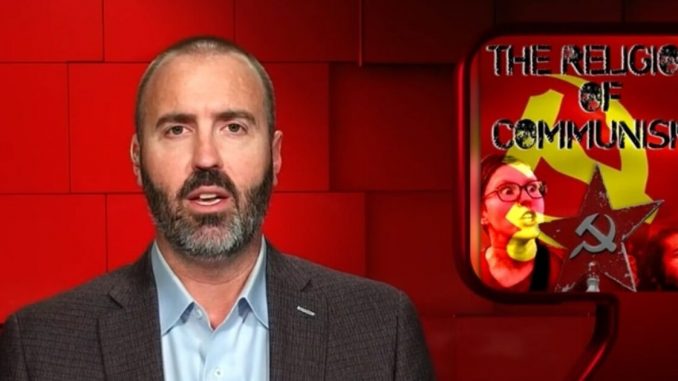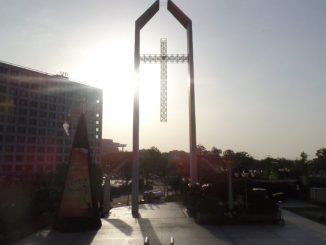
Published October 12, 2025
A well-known political commentator has recently warned that communist ideology is quietly finding its way into American religious life. Rather than targeting churches with open hostility, he claims the movement now seeks to infiltrate from within—redefining faith and reshaping the message from the pulpit.
Communism as a Religious Replacement
According to the commentator, communism should not be viewed solely as a political or economic theory, but as a belief system that mimics religion—complete with its own moral code, mission, and sense of higher purpose. In his view, this ideology seeks not to destroy Christianity outright but to merge with it, subtly rewriting doctrines until the original message is lost.
He suggests that religious seminaries and church leadership have become soft targets, allowing ideological influence to seep into theology and reshape Christian values into something more aligned with modern political narratives.
Examples of Infiltration
To illustrate his concern, he points to several trends he believes reflect this ideological drift:
-
Certain pastors introducing “progressive” teachings that deviate from biblical principles.
-
Sermons invoking a “god of pronouns,” reimagining divine identity in alignment with gender politics.
-
Churches embracing discussions on “white privilege,” which he views as replacing spiritual messages with sociopolitical agendas.
He recalls his own experience with a congregation that split apart after such themes began dominating church discussions, seeing this as proof of the ideology’s divisive power.
Examining the Claims
While the argument resonates with some, it raises questions that deserve closer examination:
-
Conceptual Stretch — Calling communism a religion may be metaphorical, but it blurs distinctions between political activism and faith-based teaching.
-
Intent vs. Influence — Cultural shifts in churches might reflect adaptation to social issues rather than deliberate ideological takeover.
-
Lack of Evidence — Most examples are anecdotal, making it difficult to determine whether they result from coordinated ideological efforts or organic cultural change.
-
Risk of Overgeneralization — Equating all modern theological discussions with communist influence could stifle honest reflection and debate within the faith community.
 Implications
Implications
-
Faith vs. Ideology Conflict
If communist or leftist worldviews are indeed being introduced into church teachings, this could blur the line between spiritual truth and political activism. Believers may start following moral frameworks rooted in ideology rather than Scripture, potentially altering the core of Christian faith in America. -
Erosion of Traditional Doctrine
As political and cultural messages replace biblical instruction, churches could drift from foundational teachings about sin, salvation, and repentance. Over time, this may lead to fragmented congregations and weakened moral authority within Christian institutions. -
Division Among Believers
The introduction of social-justice-based narratives into church life has already caused visible divisions. Congregations splitting over sermons on privilege or gender issues suggest that ideological infiltration—intentional or not—undermines unity among Christians. -
Cultural Power Shift
The church has long been a stabilizing moral force in American society. If its message becomes politicized, it risks losing influence as a moral compass and instead becoming another arm of cultural activism. -
Threat to Religious Freedom
As secular ideologies merge with faith institutions, the space for traditional or conservative voices may shrink. Clergy who resist these shifts could face social or institutional pressure to conform, leading to silencing or marginalization of orthodox beliefs. -
Need for Discernment
The warning serves as a call for Christians to remain alert—testing teachings, examining leadership, and distinguishing between genuine compassion and disguised ideology. Discernment becomes essential to preserving the authenticity of faith.
 Overall Takeaway:
Overall Takeaway:
The growing concern over ideological infiltration in America’s churches isn’t just about politics—it’s about the survival of faith itself. When doctrines once centered on the Gospel are replaced by the language of activism and class struggle, the foundation of Christianity begins to erode from within.
If believers fail to recognize these changes, the church could become indistinguishable from the secular movements it once sought to guide. Protecting the pulpit from political rebranding isn’t intolerance—it’s preservation. The message of Christ was never meant to be filtered through political slogans or cultural fads.
For many, this is a moment to stand firm: to guard the church’s message, to return to Scripture, and to reject the soft tyranny of ideological conformity. The American church has long been a refuge for truth; it must remain so, even as modern philosophies try to reshape its mission.
Faith built on timeless truth, not temporary ideology, is what will keep both the church—and the nation—standing.
SOURCES: THE GATEWAY PUNDIT – Jesse Kelly Warns of Communist Ideology Infiltrating and Taking Over American Churches (VIDEO)





Be the first to comment